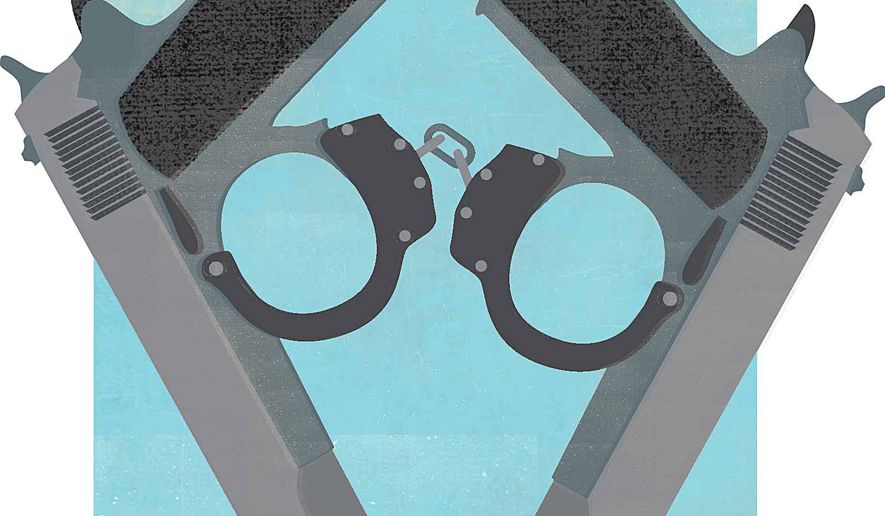OPINION:
President Obama is at it again, charging that if we could just extend “background checks” to all firearms sales, the world would be a safer place. Terrorists, armed robbers and paranoid schizophrenics bent on mass murder would be turned away by potential gun vendors and would thus be unarmed and presumably, therefore, unable to do harm to the rest of us. This has been a major part of the gun control mantra for some time in spite of numerous studies and common sense that tell us criminals don’t buy their guns at Wal-Mart or at gun shows, and that the mentally deranged have thus far managed to buy firearms legally in jurisdictions that already require stringent background checks.
To understand the gun owner reaction to the president’s desire to fiddle with the way the government defines “dealer” to extend background check requirements to sales that today are considered “private” requires a quick look back at how the current definition came into being and the abuses likely to occur under the scheme Mr. Obama wants to implement.
In 1968, in an era of skyrocketing crime, President Lyndon Johnson and liberals in Congress passed the Gun Control Act of 1968, which imposed harsh penalties on anyone dealing in guns without a Federal Firearms License, but didn’t actually define dealing. The vagueness of the law empowered federal prosecutors to “go after” anyone they arbitrarily decided was an illegal gun dealer. It resulted in abuse and injustice as federal prosecutors rounded up or entrapped gun collectors and others for selling as few as two or three guns over the course of the year. Anyone who dared sell, swap or gift a gun to anyone else became a potential target for prosecution.
Most of those prosecuted were not shady operators selling guns to criminals, but gun collectors and hobbyists selling guns from their collections in order to buy guns they didn’t have from others like themselves. These men and women quickly found themselves pursued as criminals until the abuses became so widespread and obvious that Sen. Birch Bayh of Indiana, who had been a supporter of the 1968 law, held a series of Senate hearings in the late ’70s to see what might be done to clarify the law and focus those charged with enforcing it on actual criminals rather than law-abiding gun owners and collectors.
By that time, many hobbyists had acquired federal licenses to avoid the possibility of prosecution, but the federal government, prodded by anti-gun advocates, began pressuring license holders not selling enough guns to give up their licenses. This led to the absurdity one year of prosecuting a man who had sold two guns that year and was thus viewed by prosecutors as a “dealer” while forcing another to give up his dealer’s license because he only sold two guns in that same year and thus couldn’t qualify for a dealer’s license. The federal effort to reduce the number of dealers worked. Eighty percent of them gave up their licenses and entered the no man’s land created by the vagueness of the law.
Those hearings and the passage of the Firearms Owners’ Protection Act in the ’80s put in place the current definition of dealing in firearms, which requires those whose principal business involves buying and selling guns to have a license, keep extensive records on all transactions, and require their customers to submit to a background check. It allows others who sell a few guns a year to escape both these requirements and the possibility of prosecution.
When Mr. Obama first announced that he would tighten the definition of dealing to require background checks of more firearms purchasers, it was assumed and widely reported that his administration would do so by imposing a per-year limit on private sellers. One could argue what that limit should be, but the widely discussed figure of 25 had the advantage of informing a private party who wanted to sell off part of his collection that selling more than the number chosen would be illegal.
Instead, the president decided to go back to the future by announcing that a variety of factors could result in prosecution and that anyone who sold one or two guns a year should be aware that they risked prosecution for doing so. This is guaranteed to reignite the reign of terror that Mr. Bayh and others put an end to decades ago.
That the administration wants to go there is evidence that the president seems more interested in making criminals of the law-abiding than in solving the problems he says he wants to address. Those who drew up this proposal either were ignorant of the reasons for the current rule or cavalierly unconcerned about injustice.
• David A. Keene is Opinion editor at The Washington Times and a former president of the National Rifle Association.




Please read our comment policy before commenting.